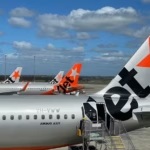Many airlines such as Breeze, newly revamped Jet Airways and Akussa Air have started or are starting during the pandemic. Many of these are low-cost airlines. Now more than ever cost is going to be on people’s minds as money becomes tight with jobs under strain and reduced further job opportunities as a result of Covid.
So how can airlines keep their costs down in the face of problems such as staff shortages and increased competition from other airlines needing the same resources? Some of these low cost airlines who are also starting now may be competing for the same beginner’s resources so to speak as low-cost airlines struggle to build long-term relationships and create reliable supply chains (regular and reliable suppliers).
Ancillary Services
Many airlines cut costs by charging for what are known as ancillary services. They may offer what many people would call a no-frills service. EasyJet for example charges for food and beverages onboard the plane. In addition, it charges people for putting baggage in the baggage hold or indeed if they want to choose where to sit.
However, the problem with this is that as prices rise over time, people may feel that they are getting a raw deal when they compare the prices they are paying now to what they were paying before with services included. This may therefore reduce passenger loyalty to the low-cost airline. Furthermore, according to the Harvard Business Review, behavioural economics suggest that when people have to pay for something that used to be free they interpret this as a personal loss.
This means that a la carte services where ancillary services are charged separately are not always popular. In addition, even when charging for ancillary services has become socially acceptable, this can sometimes be taken a step too far as was the case with Ryanair. Ryanair endured a public backlash when it had plans to charge for toilet use onboard their planes and was forced to abandon that charge.

Hi-Tech Solutions
There are, however, other ways by which money can be saved and the savings passed onto customers. These methods can be employed by low-cost airlines but have also been adopted by others as well. Using hi-tech equipment for airplane maintenance work to reduce the need for workers is an example of this.
According to Forbes, Air New Zealand and EasyJet have trialled using drones for maintenance work. This not only speeds up work but also reduces risk to human engineers as they can use high-resolution images taken by drones for guidance. 3D printing is also being used to manufacture airline parts on demand rather than having to request from a supplier. Because printing on demand is available inventory, costs of storing parts that may be needed are also saved.

Optimizing aircraft design is another way that an airline can reduce maintenance costs by producing airlines that are fuel-efficient. This can also address environmental concerns as well. Being able to anticipate problems and formulate strategies to deal with them, a process known as feed forward thinking is also a method used in the airline industry to reduce cost. Flight recorders, otherwise known as black boxes have been used historically to assess data after a crash. However, according to Forbes, Alternative Health Monitoring Systems (AHMS) which analyze data and warn of issues are being developed to help reduce cost in dealing with potential issues by detecting problems before they occur. This will also save on maintenance costs.
Having a highly-skilled workforce is also helpful in reducing maintenance costs. According to Forbes, there is a shortfall in the supply of maintenance engineers in the US and therefore companies may have to keep spare planes to avoid cancellations and late departures.
As one can see there are a number of ways in which airlines can reduce costs and pass the savings onto their customers. These range from providing a no-frills service to improving maintenance efficiency and using hi-tech solutions to improve and speed up work. As Covid results in more staff shortages, using technology to reduce costs will be beneficial to more airlines.









